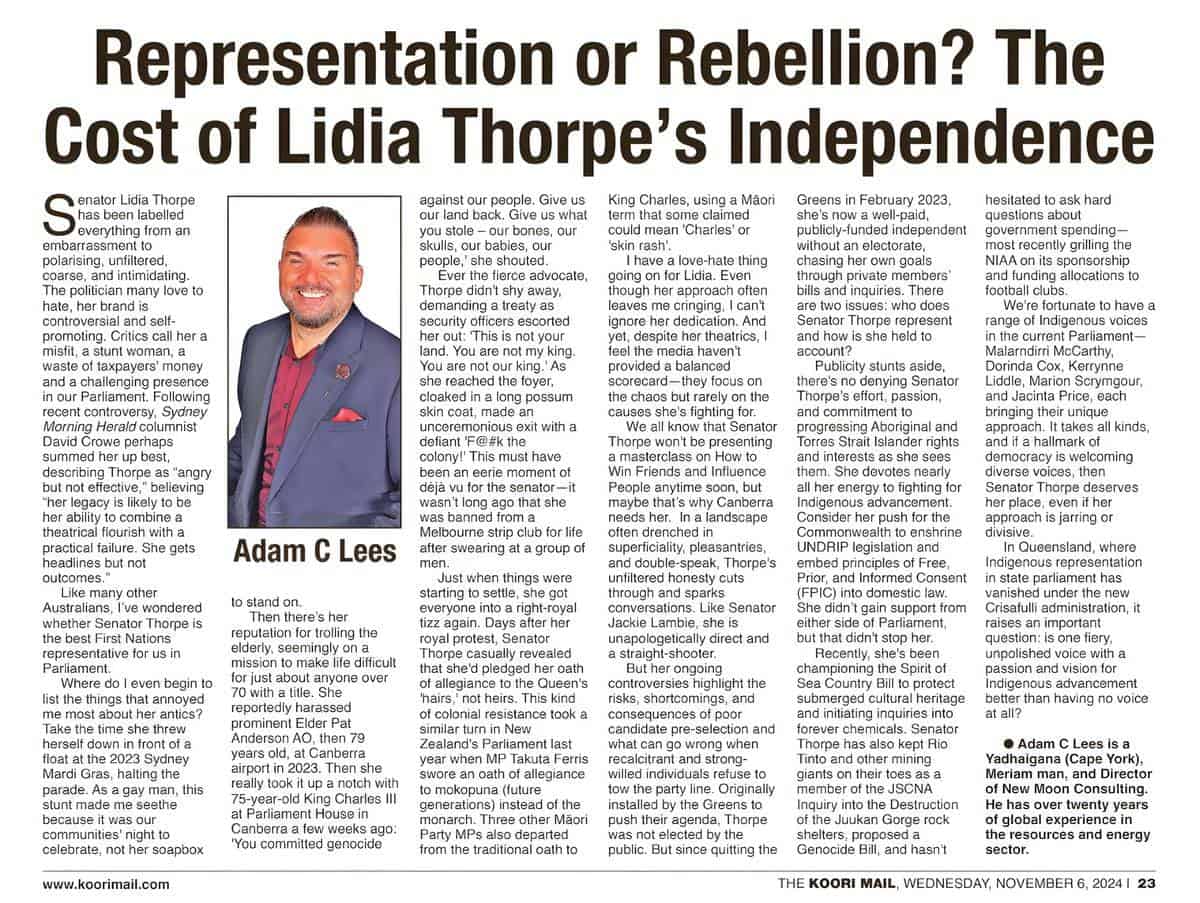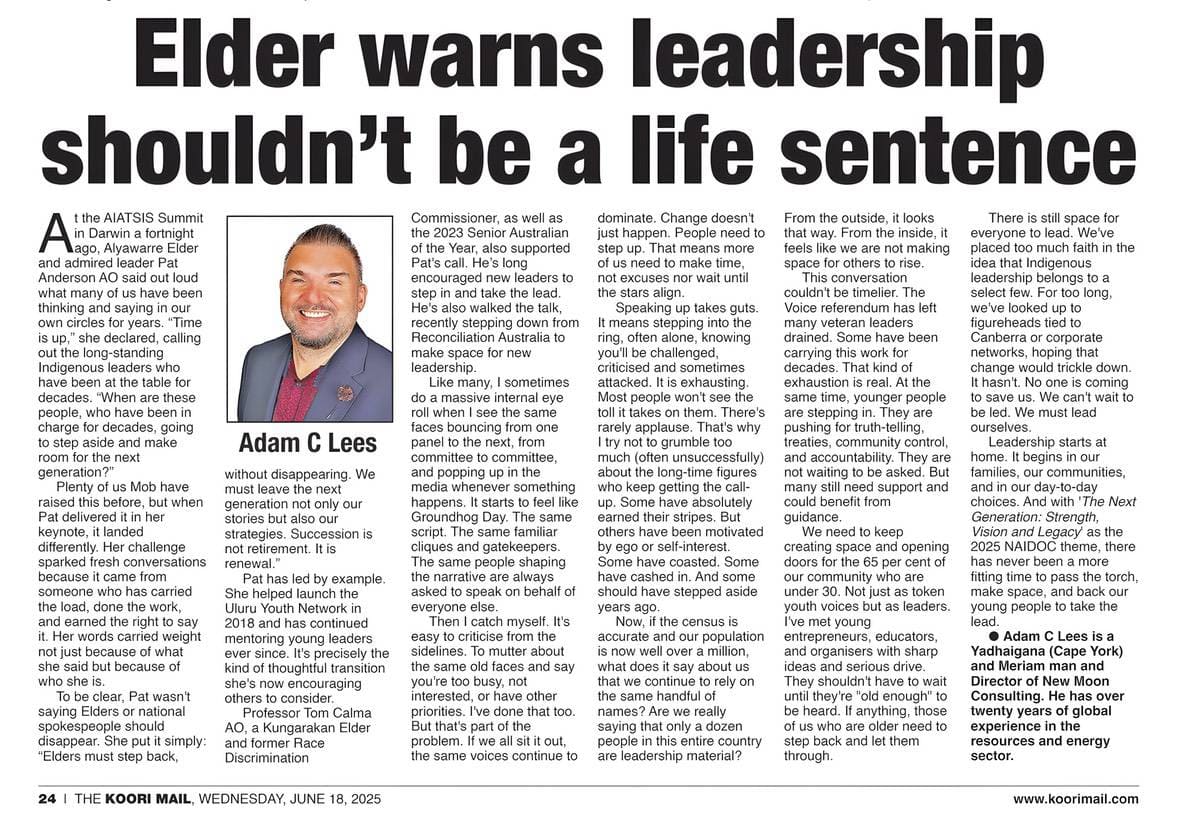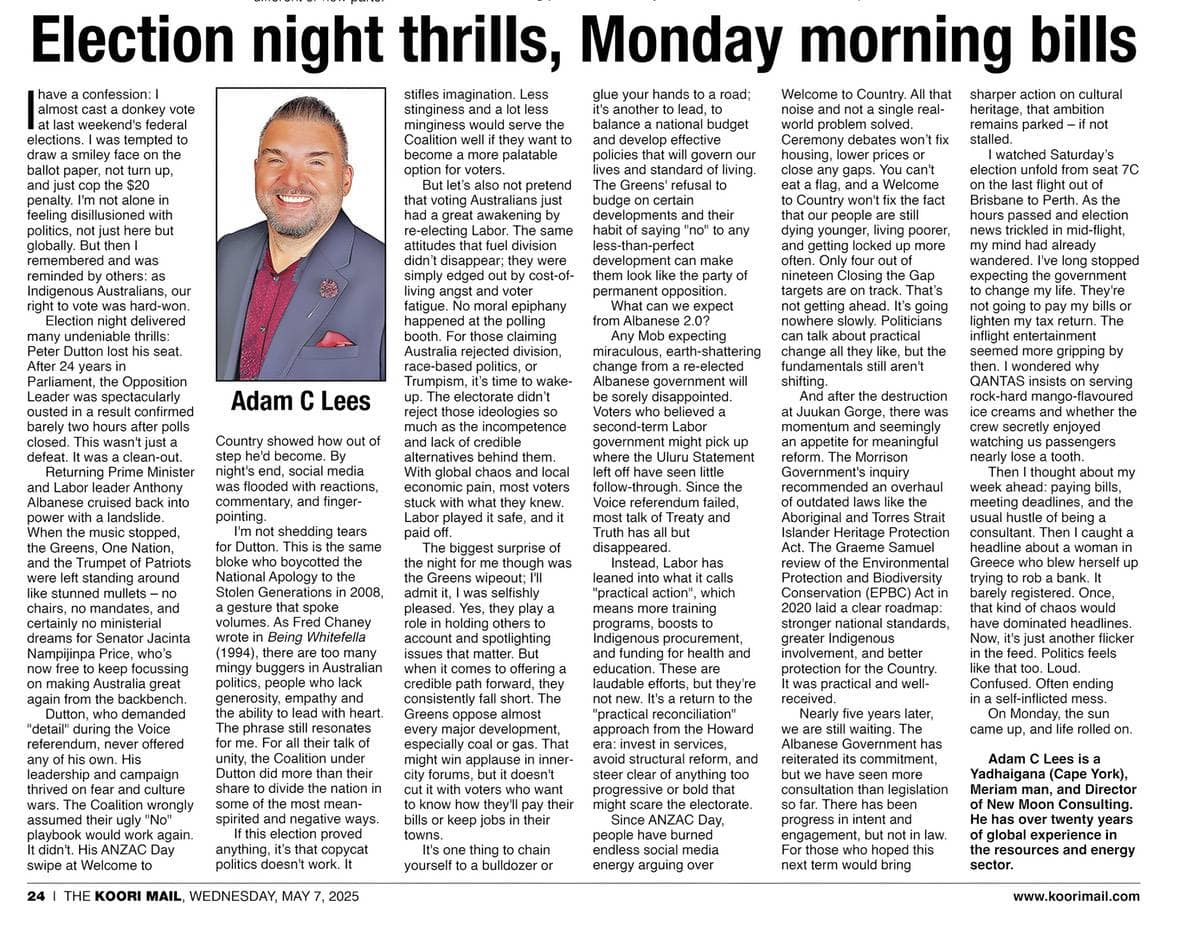Senator Lidia Thorpe has been labelled everything from an embarrassment to polarising, unfiltered, coarse, and intimidating. The politician many love to hate, her brand is controversial and self-promoting. Critics call her a misfit, a stunt woman, a waste of taxpayers’ money and a challenging presence in our Parliament. Following recent controversy, Sydney Morning Herald columnist David Crowe perhaps summed her up best, describing Thorpe as “angry but not effective,” believing “her legacy is likely to be her ability to combine a theatrical flourish with a practical failure. She gets headlines but not outcomes.”
Like many other Australians, I’ve wondered whether Senator Thorpe is the best First Nations representative for us in Parliament.
Where do I even begin to list the things that annoyed me most about her antics? Take the time she threw herself down in front of a float at the 2023 Sydney Mardi Gras, halting the parade. As a gay man, this stunt made me seethe because it was our communities’ night to celebrate, not her soapbox to stand on.
Then there’s her reputation for trolling the elderly, seemingly on a mission to make life difficult for just about anyone over 70 with a title. She reportedly harassed prominent Elder Pat Anderson AO, then 79 years old, at Canberra airport in 2023. Then she really took it up a notch with 75-year-old King Charles III at Parliament House in Canberra a few weeks ago: ‘You committed genocide against our people. Give us our land back. Give us what you stole – our bones, our skulls, our babies, our people,’ she shouted.
Ever the fierce advocate, Thorpe didn’t shy away, demanding a treaty as security officers escorted her out: ‘This is not your land. You are not my king. You are not our king.’ As she reached the foyer, cloaked in a long possum skin coat, made an unceremonious exit with a defiant ‘F@#k the colony!’ This must have been an eerie moment of déjà vu for the Senator—it wasn’t long ago that she was banned from a Melbourne strip club for life after swearing at a group of men.
Just when things were starting to settle, she got everyone into a right-royal tizz again. Days after her royal protest, Senator Thorpe casually revealed that she’d pledged her oath of allegiance to the Queen’s ‘hairs,’ not heirs. This kind of colonial resistance took a similar turn in New Zealand’s Parliament last year when MP Takuta Ferris swore an oath of allegiance to mokopuna (future generations) instead of the monarch. Three other Māori Party MPs also departed from the traditional oath to King Charles, using a Māori term that some claimed could mean ‘Charles’ or ‘skin rash’.
I have a love-hate thing going on for Lidia. Even though her approach often leaves me cringing, I can’t ignore her dedication. And yet, despite her theatrics, I feel the media haven’t provided a balanced scorecard—they focus on the chaos but rarely on the causes she’s fighting for.
We all know that Senator Thorpe won’t be presenting a masterclass on How to Win Friends and Influence People anytime soon, but maybe that’s why Canberra needs her. In a landscape often drenched in superficiality, pleasantries, and double-speak, Thorpe’s unfiltered honesty cuts through and sparks conversations. Like Senator Jackie Lambie, she is unapologetically direct and a straight-shooter.
But her ongoing controversies highlight the risks, shortcomings, and consequences of poor candidate pre-selection and what can go wrong when recalcitrant and strong-willed individuals refuse to tow the party line. Originally installed by the Greens to push their agenda, Thorpe was not elected by the public. But since quitting the Greens in February 2023, she’s now a well-paid, publicly funded independent without an electorate, chasing her own goals through private members’ bills and inquiries. There are two issues: who does Senator Thorpe represent and how is she held to account?
Publicity stunts aside, there’s no denying Senator Thorpe’s effort, passion, and commitment to progressing Aboriginal and Torres Strait Islander rights and interests as she sees them. She devotes nearly all her energy to fighting for Indigenous advancement. Consider her push for the Commonwealth to enshrine UNDRIP legislation and embed principles of Free, Prior, and Informed Consent (FPIC) into domestic law. She didn’t gain support from either side of Parliament, but that didn’t stop her.
Recently, she’s been championing the Spirit of Sea Country Bill to protect submerged cultural heritage and initiating inquiries into forever chemicals. Senator Thorpe has also kept Rio Tinto and other mining giants on their toes as a member of the JSCNA Inquiry into the Destruction of the Juukan Gorge rock shelters, proposed a Genocide Bill, and hasn’t hesitated to ask hard questions about government spending—most recently grilling the NIAA on its sponsorship and funding allocations to football clubs.
We’re fortunate to have a range of Indigenous voices in the current Parliament—Malarndirri McCarthy, Dorinda Cox, Kerrynne Liddle, Marion Scrymgour, and Jacinta Price, each bringing their unique approach. It takes all kinds, and if a hallmark of democracy is welcoming diverse voices, then Senator Thorpe deserves her place, even if her approach is jarring or divisive.
In Queensland, where Indigenous representation in State Parliament has vanished under the new Crisafulli administration, it raises an important question: is one fiery, unpolished voice with a passion and vision for Indigenous advancement better than having no voice at all?
Adam C Lees is a Yadhaigana (Cape York), Meriam man, and Director of New Moon Consulting. He has over twenty years of global experience in the resources and energy sector.







